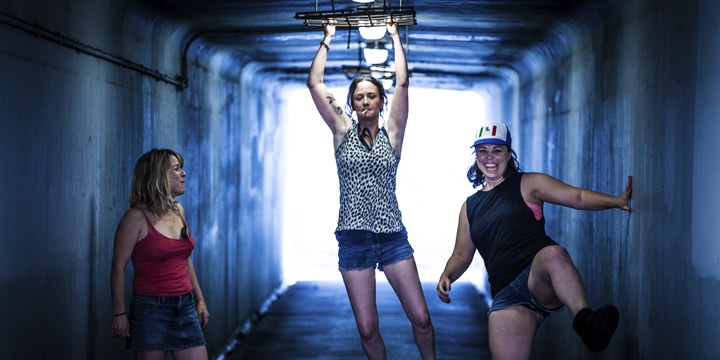Patricia Cornelius talks the way she writes: colourfully, with an occasional splash of language blue enough to make the sheltered wince.
It would perhaps be foolish to expect the mind behind plays called Shit and Slut to communicate in any other way. But for Cornelius, cursing isn’t about eliciting cheap shock value, or merely trying to sustain the attention of strangers – it’s about embracing the ugly, rubbed-raw beauty of the way Australians speak, something that we seem to have a collective shyness about.
“I love the Australian vernacular,” Cornelius says. “It’s so raw and funny and vulgar at times. It’s strange to pretend we don’t have our own voice. We have a multitude of voices and we ignore them all … I mean, [I write] the way I talk. I can’t write in a middle-class voice. I don’t know the language.”
Indeed, language is the key to much of Cornelius’ work, particularly Shit. The darkly funny three-hander focuses on a brace of women who directly challenge the notion that female speech has to be refined or mannered, and their coarse turn of phrase becomes a form of rebellion in and of itself. It’s a theme that Cornelius considers genuinely important, and she draws great strength from the galvanising impact of slang.
“There is great fun in it,” she says. “Language can be so scary. I live on a street that has a famous tram that takes people down to get drugs. And it’s really extraordinary, the times you get on that tram and it’s just alive with voices, voices that you don’t hear ever when you’re in the theatre. A lot of people might feel disgust, but actually there’s great humour in it. There’s great pathos in it. And great power. It’s extraordinary.”
The nature of the language she chooses to use means Cornelius does occasionally have to take up the mantle of translator. She is aware that merely jotting down every curse and inflected and infected turn of phrase she hears will turn some punters away, and so her job frequently becomes about balancing audience concerns with the brutal truths she wants to communicate.
“You have to teach the language,” she says. “If I copied a lot of the vernacular as you hear it on the tram or in the street, it gets ugly, and it gets ugly really quickly. In a way I’m attracted to it, but I’m attracted to kind of transforming it. I know I have to cheat it, to work it in a way so that people don’t go, ‘Eugh, that voice, that sound, that rhythm.’ It’s about making it quite beautiful at times, and humorous and lovely. A whole play about being on tram 86 wouldn’t be any good.” She laughs. “You’d want to get off after a while.”
Initially, Cornelius shows off some of her trademark renegade refusal when asked exactly how she goes about refining the raw coal of language. “I’m not telling you in case somebody else nicks it,” she laughs. “I have the most unacademic approach to playwrighting. Some people ask, ‘How do you work structure?’ and I go, ‘Oh, it’s just fucking hard.’”
But she does have tips to share, and is happy to reveal that her guiding philosophy involves sidestepping anything that could be interpreted as twee or patronising. “The biggest trick for me that I’ve learnt is to never be sentimental,” she says. “That’s so irksome. Most people aren’t sentimental about their lot. They’re amazingly straightforward. You get such clarity and clout in avoiding sentiment.”
As far as Cornelius is concerned, that clout is often lacking in Australian theatre. She is directly opposed to the casual art-consuming set; those who dress up fancy to catch a bit of Shakespeare before quaffing down a rich meal, only to then spend their evening more concerned with their ensuing acid reflux attack than the theatre they’ve just consumed.
“Culturally, ignoring most of our society is pretty silly, and makes theatre pretty bland,” she says. “There’s apparently an appetite even in the mainstream for Australian work because it sells, but the companies are still so wary of it. And yet there is an interest in the public.
“This is what culturally happens in this country. We’re so stunted – we have terrific shows that only get one life, and maybe only a few people remember them or go to see them, and then wonder why they never grew into other performances. That’s the history of the country culturally, really. We don’t nurture our artists.”
Cornelius says a lot of that selfsame dearth comes down to the Australian habit of searching internationally for cultural reference points. We are uniformly afraid of looking within, and prefer to turn to the blinding lights of other countries to find ourselves.
“It’s such an old adage, but it’s about the cultural cringe. We still look to places we think are culturally more sophisticated. So we look to New York and we look to London. And then if you get the chance to go there, of course there’ll be something that will be terrific, but actually a lot of the work is moribund and commercially rubbish. It’s quite difficult to find the vibrancy of new work anywhere. But we don’t trust our own new work.”
She laughs bitterly. “It’s just fucking sad. We’re sad. We hold our cap in our hands. It’s pathetic.”
[Shit photo by Sebastian Bourges]
Shit runsTuesday January 17 – Saturday January 21,as part of Sydney Festival 2017, at Seymour Centre.


































